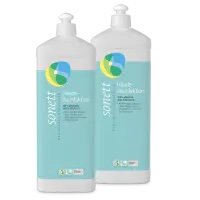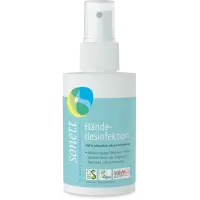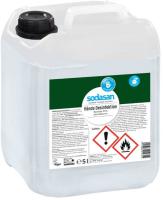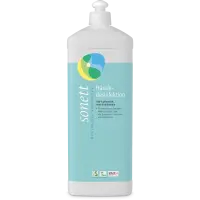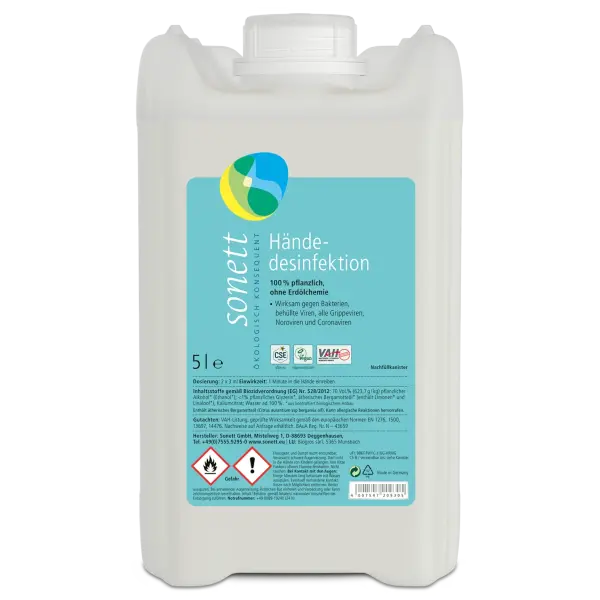
- Sonett Hand Disinfection in a 5-liter canister,
- effective against bacteria, enveloped viruses, all flu viruses, coronaviruses, and noroviruses, MRSA, ESBL,
- effective with 70% plant-based alcohol, 100% from controlled organic cultivation,
- without petrochemicals
Product Features
Application Sonett Hand Disinfection 5 Liters
Now available, the Sonett Hand Disinfection in a large 5-liter canister. Ready-to-use alcoholic solution for hygienic hand disinfection. Best to simply decant with a spout or a filling pump into the Sonett hand disinfection dispenser or into the 1-liter refill bottle. Extremely effective against bacteria, enveloped viruses, coronaviruses including flu viruses, and noroviruses.
Dosage
2 x 3 ml of the solution = 2 pumps of the dispenser bottle, rub into hands for 1 minute. After this time, all vegetative germs of bacteria, such as salmonella or coliform bacteria, fungi, and flu viruses are killed. Use Sonett Hand Disinfection safely. Always read the label and product information before use.
Size:
5 liters in a canister
Important Note
Biocides are subject to different national restrictions. Due to the EU Biocidal Products Regulation (Regulation (EU) No. 528/2012), we can only sell biocides within Germany.
Tested According to European Norms:
At low load and 20°C, concentrated, EN 1236, EN 13697, MRSA/ESBL: 1 min., EN 14476:2013+A2:2019: 1 min., EN 1500:2017: 1 min., VAH standard (requirements and methods 2015/2019): 1 min.
Biocidal Regulation
BAuA Reg.-No. N-43659, Switzerland: CHZB0936, VAH-listed (Association for Applied Hygiene e.V.)
Product Declaration
Plant-based alcohol (ethanol), from controlled organic cultivation 70% (V/V), plant-based glycerin, from controlled organic cultivation <1%, essential bergamot oil, from controlled organic cultivation <1%, potassium salt of citric acid <1%, water to 100%
Ingredient List According to EC 648/2004 Sonett Hand Disinfection 5 Liters
Alcohol*, Aqua, Glycerin*, Potassium Citrate, Parfum*, Limonene* *certified organically grown
Ingredients According to EC 528/2012
Plant-based alcohol 62.37 g / 100 ml
Hazard Symbol
Danger
Contains essential bergamot oil (Citrus aurantium ssp bergamia oil), which can cause allergic reactions. Liquid and vapor highly flammable. Can cause serious eye irritation. Keep out of reach of children. Keep away from heat, sparks, and open flame. No smoking. In case of contact with eyes: Rinse cautiously with water for several minutes. Remove contact lenses if present and easy to do. Continue rinsing. If eye irritation persists: Get medical advice/attention and have the container or label at hand. Dispose of contents and container according to local and national regulations.
Origin and Properties of the Ingredients
Pure plant-based bio-alcohol causes the inactivation of a broad spectrum of bacteria, yeasts, fungi, and viruses. The plant-based alcohol is obtained by fermenting starchy plants such as grains, corn, or potatoes. The effect of the alcohol is based, among other things, on its ability to deprive the microorganism of cell water. Plant-based bio-glycerin, added in small amounts, prevents the skin from drying out.
Biological Degradation
The main component of the product is ethanol from controlled organic wheat. This alcohol is 100% biologically degraded within 1–2 days.
Packaging
Canister: PE
Certification
CSE (Certified Sustainable Economics), Vegan Society
EAN: 4007547209305 Manufacturer: Sonett GmbH Mistelweg 1, 88693 Deggenhausen [email protected]Flamme

Entzündbare Gase, Gefahrenkategorie 1 Aerosole, Gefahrenkategorien 1, 2 Entzündbare Flüssigkeiten, Gefahrenkategorien 1, 2, 3 Entzündbare Feststoffe, Gefahrenkategorien 1, 2 Selbstzersetzliche Stoffe und Gemische, Typen B (+ Piktogramm GHS01), C, D, E, F Pyrophore Flüssigkeiten, Gefahrenkategorie 1 Pyrophore Feststoffe, Gefahrenkategorie 1 Selbsterhitzungsfähige Stoffe und Gemische, Gefahrenkategorien 1, 2 Stoffe und Gemische, die in Berührung mit Wasser entzündbare Gase entwickeln, Kategorien 1, 2, 3 Organische Peroxide, Typen B (+ Piktogramm GHS01), C, D, E, F Stoffe und Gemische, die in Berührung mit Wasser entzündbare Gase abgeben, Gefahrenkategorien 1, 2, 3
Ausrufezeichen

Akute Toxizität (oral, dermal, inhalativ), Kategorie 4 Reizwirkung auf die Haut, Kategorie 2 Schwere Augenreizung, Kategorie 2 Sensibilisierung der Haut, Kategorien 1, 1A und 1B Spezifische Zielorgan-Toxizität (einmalige Exposition), Kategorie 3 Atemwegsreizung, Kategorie 3 Narkotisierende Wirkung Die Ozonschicht schädigend, Kategorie 1





